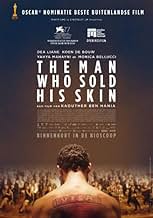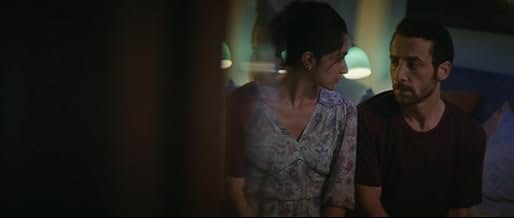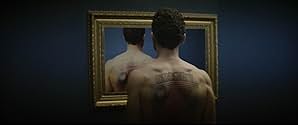The Man Who Sold His Skin
- 2020
- 1 घं 44 मि
IMDb रेटिंग
6.9/10
7.5 हज़ार
आपकी रेटिंग
अपनी भाषा में प्लॉट जोड़ेंHis own body turned into a living work of art and promptly exhibited in a museum, Sam, a Syrian refugee, will soon realize to have sold away more than just his skin.His own body turned into a living work of art and promptly exhibited in a museum, Sam, a Syrian refugee, will soon realize to have sold away more than just his skin.His own body turned into a living work of art and promptly exhibited in a museum, Sam, a Syrian refugee, will soon realize to have sold away more than just his skin.
- 1 ऑस्कर के लिए नामांकित
- 9 जीत और कुल 12 नामांकन
Koen De Bouw
- Jeffrey Godefroi
- (as Koen de Bouw)
फ़ीचर्ड समीक्षाएं
A desperate man on the run from Syria, sells his back as a canvas for an eccentric artist. He sits as a display for audiences at galleries and museums. His girlfriend Has moved to Belgium with her new husband. He is well paid but has doubts about his choice. The story uses a real life situation where a man sold his skin to an artist. The movie was nominated for an Oscar and I rank it just below A Better Life in the foreign film category.
The opening scene shows a framed item being hung in a stark white exhibition space. We're then greeted to the sound of purring cat as a man stirs awake. This is, for the most part, the nearest we get to a happy scene: 'The man who sold his skin' is an excellent film, but it's not a particularly pleasant story being told.
There is an unyielding tension pervading the feature that comes from the mere knowledge of the premise, let alone seeing the narrative play out. Passing moments of levity, and the quality of the film-making craft on display, help to offset that feeling, and an accompanying melancholy, but don't truly make this easier to watch.
Yet make no mistake, 'The man who sold his skin' is a fine film, very well made. Writer-director Kaouther Ben Hania's camerawork is exquisite, with many eye-catching shots as worthy of appreciation as any piece of art in a museum. There are several instances where lens flare, or the refraction of light through glass, is used to partly obscure a shot with an artistic touch that I think often gets lost in many pictures employing the same tricks. Then, too, the music of composer Amine Bouhafa catches our attention to, perfectly complementing the scenes we see.
And the cast is outstanding. The only actor here I distinctly recognize is Monica Bellucci, whose presence is surprising but welcome, as she brings an entrancing, understated intensity to her role. I could swear I've seen Koen De Bouw in other features, though a glance at his credits suggests otherwise. Still, there's a purposefulness, and cunning, in his countenance that we can't tear our eyes away from. Above all, though, I would love to learn more about Dea Liane, and star Yahya Mahayni, whose lack of renown belies great skill. It's a joy to see them at play, and I'd love to watch more of their features.
Engrossing as Ben Hania's screenplay is, the narrative is a thinly veiled vehicle for stark themes of human rights, racism, exploitation, dehumanization, and the tricks we fool ourselves into believing in pursuit of a better life. There are some especially ugly and cringe-worthy moments on display as these notions are laid as bare as the skin on protagonist Sam Ali's back. Once more - it's undeniably captivating, but viewers looking for an uplifting flick may wish to look elsewhere.
Still, when all is said and done, the ending is a little bit shocking, yet also deeply rewarding. It's a fine capstone to a film that has explored some very murky territory, and further credit to the writing.
There's no question in my mind that 'The man who sold his skin' is well deserving of every accolade to come its way. It can be a difficult movie to watch at times, but it's so well made that it's a journey very much worth taking, and finding to watch wherever you can.
There is an unyielding tension pervading the feature that comes from the mere knowledge of the premise, let alone seeing the narrative play out. Passing moments of levity, and the quality of the film-making craft on display, help to offset that feeling, and an accompanying melancholy, but don't truly make this easier to watch.
Yet make no mistake, 'The man who sold his skin' is a fine film, very well made. Writer-director Kaouther Ben Hania's camerawork is exquisite, with many eye-catching shots as worthy of appreciation as any piece of art in a museum. There are several instances where lens flare, or the refraction of light through glass, is used to partly obscure a shot with an artistic touch that I think often gets lost in many pictures employing the same tricks. Then, too, the music of composer Amine Bouhafa catches our attention to, perfectly complementing the scenes we see.
And the cast is outstanding. The only actor here I distinctly recognize is Monica Bellucci, whose presence is surprising but welcome, as she brings an entrancing, understated intensity to her role. I could swear I've seen Koen De Bouw in other features, though a glance at his credits suggests otherwise. Still, there's a purposefulness, and cunning, in his countenance that we can't tear our eyes away from. Above all, though, I would love to learn more about Dea Liane, and star Yahya Mahayni, whose lack of renown belies great skill. It's a joy to see them at play, and I'd love to watch more of their features.
Engrossing as Ben Hania's screenplay is, the narrative is a thinly veiled vehicle for stark themes of human rights, racism, exploitation, dehumanization, and the tricks we fool ourselves into believing in pursuit of a better life. There are some especially ugly and cringe-worthy moments on display as these notions are laid as bare as the skin on protagonist Sam Ali's back. Once more - it's undeniably captivating, but viewers looking for an uplifting flick may wish to look elsewhere.
Still, when all is said and done, the ending is a little bit shocking, yet also deeply rewarding. It's a fine capstone to a film that has explored some very murky territory, and further credit to the writing.
There's no question in my mind that 'The man who sold his skin' is well deserving of every accolade to come its way. It can be a difficult movie to watch at times, but it's so well made that it's a journey very much worth taking, and finding to watch wherever you can.
YES! "The Man Who Sold His Skin" left me with so many answers to gut hunches I had about the businness of art and how it steals peoples souls. This is a story driven movie, simple filming some amazing shots and locations, economic dialogue that required some of the most intense acting from Yahya Mahani. This brothers abilty to show emotion was so thorough that I actually felt what he was going through. Such a powerful perfomance that I had to come on here and tell people of this movie. I have never seen or heard a story like this. A must see for REAL movie fans who need more then watching blind entertainment. I found this while searching tattoos.
"The Man Who Sold His Skin" depicts a refugee forced into an unpleasant predicament. In showing the plight of refugees, Kaouther Ben Hani's Academy Award-nominated movie also looks at the cold attitudes of supposedly highbrow individuals. The sad thing is that there are probably people in real life who have gotten subjected to this sort of thing. I recommend it.
Greetings again from the darkness. Lao Tzu wrote, "Being loved deeply by someone gives you strength, while loving someone gives you courage." But to what extreme would you go for true love, and how far is too far? Writer-director Kaouther Ben Hania offers an early scene on a commuter train as Sam Ali and Abeer flirt and tease to the point that he publically, and loudly, proclaims his love for her. Unfortunately for him, his outburst occurs in Syria, where human rights are always in peril. In fact, this love story is burdened with the weight of human rights, individual choices, and the power of art.
Ms. Ben Hania bookends her film with a choreographed art installation coated in a blizzard of white walls and white gloves. It's 2011, when a distant relative in law enforcement assists Sam Ali (Yahya Mahayni) with his (quite creative) escape from Syria to Lebanon - after a painful slap of reality accompanies Sam's goodbye to his beloved Abeer (Dea Liane in her first screen credit). As Sam flees for his life, Abeer is pressured by her family into an arranged marriage.
We then flash forward one year to find Sam working in a Beirut chicken factory. He scrounges for food at the buffet of local art galleries until one day he is spotted by Soraya (a blond Monica Bellucci), the agent for acclaimed artist Jeffrey Godefroy (Koen De Bouw). When Sam and Godefroy meet, the artist tells him that art is "alive" and, more precisely, "I want your back". A Faustian deal is cut. Godefroy turns Sam Ali into a living piece of art by tattooing his back, and Sam gets the travel visa he desperately needs to reunite with Abeer.
With Sam basically a commodity (there are even T-shirts of his back in the gift shop), there are protests to his being exploited - this despite Sam enjoying the nice hotels, room service, and promise of the visa. Of course, as with any commodity, it's only a matter of time before the almighty dollar comes into play, and soon Sam is auctioned off to a collector. Subtle humor has a role throughout much of the film, and Mr. Mahayni is quite believable as a Syrian refugee sacrificing for love. Ms. Ben Hania's film is inspired by "Tim", an original artwork tattoo by Wim Delvoye sold to a collector in 2008. Mr. Delvoye, a controversial Belgian artist, even makes a brief appearance here as an insurance agent. This is a thought-provoking love story, survival tale, and commentary on the bent side of the art world. When is a man truly free? We don't typically think of Tunisia as a hotbed for cinema, but this film deserves attention.
Ms. Ben Hania bookends her film with a choreographed art installation coated in a blizzard of white walls and white gloves. It's 2011, when a distant relative in law enforcement assists Sam Ali (Yahya Mahayni) with his (quite creative) escape from Syria to Lebanon - after a painful slap of reality accompanies Sam's goodbye to his beloved Abeer (Dea Liane in her first screen credit). As Sam flees for his life, Abeer is pressured by her family into an arranged marriage.
We then flash forward one year to find Sam working in a Beirut chicken factory. He scrounges for food at the buffet of local art galleries until one day he is spotted by Soraya (a blond Monica Bellucci), the agent for acclaimed artist Jeffrey Godefroy (Koen De Bouw). When Sam and Godefroy meet, the artist tells him that art is "alive" and, more precisely, "I want your back". A Faustian deal is cut. Godefroy turns Sam Ali into a living piece of art by tattooing his back, and Sam gets the travel visa he desperately needs to reunite with Abeer.
With Sam basically a commodity (there are even T-shirts of his back in the gift shop), there are protests to his being exploited - this despite Sam enjoying the nice hotels, room service, and promise of the visa. Of course, as with any commodity, it's only a matter of time before the almighty dollar comes into play, and soon Sam is auctioned off to a collector. Subtle humor has a role throughout much of the film, and Mr. Mahayni is quite believable as a Syrian refugee sacrificing for love. Ms. Ben Hania's film is inspired by "Tim", an original artwork tattoo by Wim Delvoye sold to a collector in 2008. Mr. Delvoye, a controversial Belgian artist, even makes a brief appearance here as an insurance agent. This is a thought-provoking love story, survival tale, and commentary on the bent side of the art world. When is a man truly free? We don't typically think of Tunisia as a hotbed for cinema, but this film deserves attention.
क्या आपको पता है
- ट्रिवियाWhile director Kaouther Ben Hania was visiting the Louvre Museum in Paris in 2012, there was a retrospective of Belgian artist Wim Delvoye. There she saw, in Napoleon III's apartments, Delvoye's Tim (2006 - 08), in which the artist had tattooed the back of Tim Steiner, who was sitting on an armchair with his shirt off displaying Delvoye's design. The piece was sold to a German art collector and Tim is contractually obliged to spend a certain amount of time, topless and sitting still, in a gallery every year. Wim Delvoye appears in the movie as the insurance guy.
- गूफ़When Sam Ali changes his seat at the train at 05:55, the place of the man in the back seat changes each time the camera switches between Sam and Abeer.
- कनेक्शनFeatured in 93वें अकादमी पुरस्कार (2021)
- साउंडट्रैकFiliae maestae Jerusalem, RV 638: I, 'Filiae maestae Jerusalem'
Music by Antonio Vivaldi (uncredited)
Conducted and Performed by Philippe Jaroussky (Audio) (p)
Performed by Ensemble Artaserse (uncredited)
2014 Erato/Warner Classics, Warner Music UK Ltd.
टॉप पसंद
रेटिंग देने के लिए साइन-इन करें और वैयक्तिकृत सुझावों के लिए वॉचलिस्ट करें
- How long is The Man Who Sold His Skin?Alexa द्वारा संचालित
विवरण
- रिलीज़ की तारीख़
- कंट्री ऑफ़ ओरिजिन
- आधिकारिक साइटें
- भाषाएं
- इस रूप में भी जाना जाता है
- The Man Who Sold His Back
- फ़िल्माने की जगहें
- उत्पादन कंपनियां
- IMDbPro पर और कंपनी क्रेडिट देखें
बॉक्स ऑफ़िस
- बजट
- €22,30,000(अनुमानित)
- दुनिया भर में सकल
- $2,27,290
- चलने की अवधि
- 1 घं 44 मि(104 min)
- रंग
- ध्वनि मिश्रण
- पक्ष अनुपात
- 2.39 : 1
इस पेज में योगदान दें
किसी बदलाव का सुझाव दें या अनुपलब्ध कॉन्टेंट जोड़ें





























